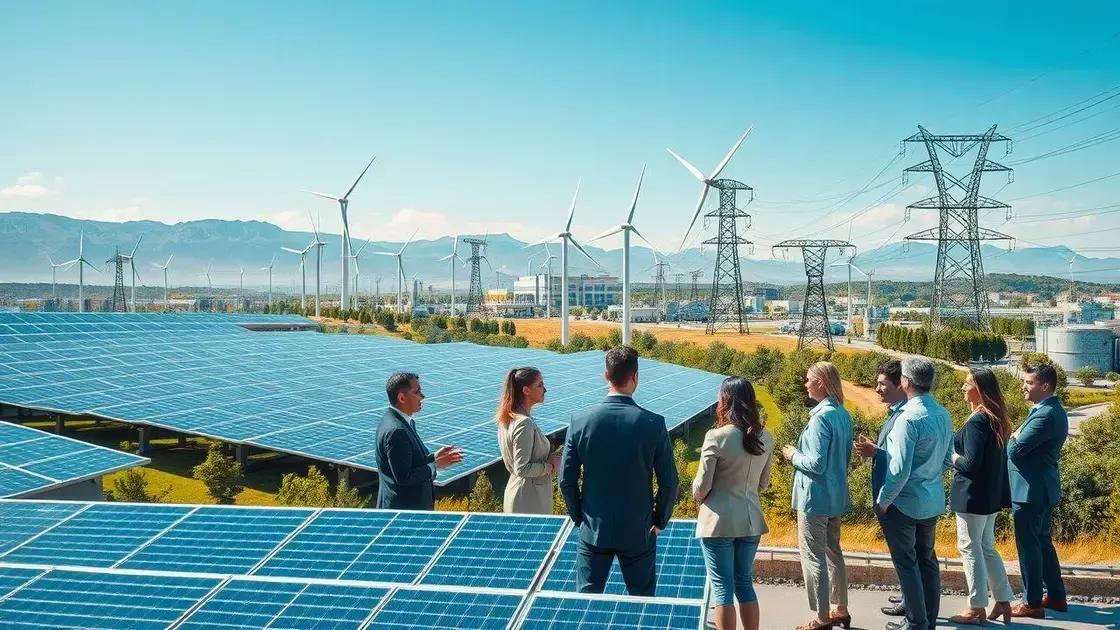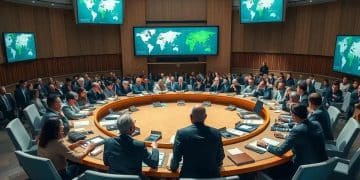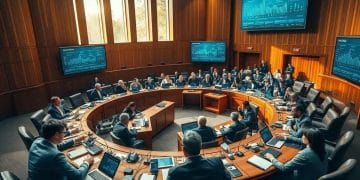Strategy energy policy discussion: insights you need

The future trends in energy policy focus on promoting renewable energy sources, integrating smart technologies, and enhancing community involvement to create a more sustainable and efficient energy landscape.
Strategy energy policy discussion is more relevant than ever as we navigate complex energy challenges. Have you thought about how policies impact our daily lives and future sustainability? Let’s dive into the insights that will shape our understanding.
Understanding the current energy landscape
The current energy landscape is shaped by numerous factors that influence how we produce, consume, and think about energy. Technology, policy, and environmental concerns all play a role in this dynamic situation. Understanding these elements is crucial for anyone interested in the future of energy.
Key Elements Influencing the Energy Landscape
The transition to renewable energy sources is one of the most significant changes we see today. More than ever, we rely on wind, solar, and hydropower. These resources help reduce our dependency on fossil fuels, leading to a cleaner environment and sustainable growth.
- Advancements in technology improve energy efficiency.
- Government policies encourage renewable energy investments.
- Public awareness and demand for sustainable practices drive changes.
Another important aspect is the global nature of energy supply. Geopolitical factors can affect energy prices and availability, making our economy vulnerable to fluctuations. Therefore, countries are encouraged to diversify their energy sources which leads to a more resilient system.
Challenges Facing the Energy Sector
Despite this shift, several challenges remain. The energy landscape must balance affordability with sustainability. Many people still rely on traditional sources for their heating and electricity, making the transition complicated. It is essential to create policies that consider all aspects of energy usage.
Additionally, investing in new infrastructure is vital. Many regions need upgrades to accommodate advancements in renewable technologies. As a result, governments and private sectors must collaborate to create a future-focused energy infrastructure.
In conclusion, understanding the current energy landscape requires us to consider various influences and challenges. By staying informed and committed to innovative solutions, we can pave the way for a more sustainable energy future.
Key challenges in energy policy

The key challenges in energy policy are significant obstacles that governments and organizations face in pursuing sustainable energy goals. Understanding these challenges is essential for creating effective policies that align with economic, environmental, and social needs.
Balancing Energy Sources
One major challenge is balancing renewable energy sources with traditional fossil fuels. Transitioning to renewables is critical for reducing greenhouse gas emissions but requires careful planning. Policymakers must consider the current energy infrastructure and how to integrate new technologies effectively.
- Investing in renewable energy infrastructure.
- Ensuring energy security during the transition period.
- Addressing public concerns and resistance to change.
Another important factor is the economic ramifications of energy policies. Supporting new technologies and systems often require substantial funding. Policymakers must find innovative financial solutions to promote clean energy while maintaining stable energy prices for consumers.
Addressing Regulatory and Market Issues
Regulatory frameworks can create further complications. Different political interests and stakeholder groups can slow policy progression. Streamlining regulations is vital for facilitating changes in the energy landscape. Clear rules and guidelines help support investment in cleaner energy sources.
Market dynamics also play a crucial role. Fossil fuel markets are deeply ingrained in the global economy. Changes in supply and demand can lead to price volatility, making it challenging to implement stable long-term energy policies. Policymakers must anticipate market shifts and be agile in their approaches.
Communicating with the public about energy policies is another critical challenge. Ensuring the community understands the benefits of new policies can result in better compliance and support. Effective outreach and education programs are necessary for building trust and encouraging participation.
Innovative strategies for energy management
Innovative strategies for energy management are essential for creating more efficient and sustainable energy systems. These strategies not only help reduce costs but also support environmental goals.
Adopting Smart Technologies
One of the most significant innovations in energy management is the use of smart technologies. Smart meters enable real-time monitoring of energy consumption, which helps consumers and businesses understand their usage patterns. This knowledge allows for better decision-making regarding energy savings.
- Integration of IoT devices to optimize energy use.
- Utilization of data analytics for forecasting energy demand.
- Implementation of automated energy management systems.
Moreover, smart grids contribute to more reliable energy distribution. By improving communication between energy suppliers and consumers, smart grids enhance the flexibility and resilience of the energy system.
Encouraging Renewable Energy Adoption
Another strategy is promoting the adoption of renewable energy sources such as solar, wind, and geothermal. Incentives like tax credits and rebates encourage individuals and businesses to invest in renewable technologies. Energy management companies are increasingly offering Power Purchase Agreements (PPAs), making renewable energy more accessible.
Transitioning to renewables can significantly cut emissions, aiding climate change mitigation efforts. This shift not only benefits the environment but also stimulates economic growth through job creation in the renewable sector.
Furthermore, corporations are beginning to set sustainability targets, committing to use 100% renewable energy. This trend towards corporate responsibility reflects changing public attitudes about the importance of sustainable practices.
Finally, community-based energy initiatives empower local populations to take charge of their energy management. Local solar cooperatives and community wind projects ensure that energy decisions reflect the community’s needs and preferences. By fostering engagement, communities can leverage their resources for effective energy use.
Future trends in energy policy

The future trends in energy policy are shaping the way nations approach energy consumption and sustainability. As the world faces climate change challenges, it’s crucial to adapt policies that promote cleaner energy.
Increased Focus on Renewables
One clear trend is the growing emphasis on renewable energy sources. Governments are implementing policies to support solar, wind, and hydropower. By providing incentives and subsidies, they aim to lower the barriers for businesses and households to adopt cleaner energy solutions.
- Investment in renewable infrastructure is on the rise.
- Carbon pricing mechanisms are being considered.
- International agreements are pushing for ambitious emission reduction targets.
This shift not only helps reduce greenhouse gases but also creates jobs in emerging energy sectors. As technology advances, the cost of renewables continues to drop, making them more attractive.
Integration of Smart Technologies
Another trend is the integration of smart technologies in energy management. Smart grids enable efficient distribution and help balance supply and demand. They also allow consumers to monitor and control their energy usage effectively.
Moreover, the use of artificial intelligence (AI) is becoming more common in forecasting energy needs and optimizing resources. This technology helps identify trends and makes it easier to manage energy consumption dynamically. By adopting such solutions, policymakers and utilities can enhance reliability in the energy sector.
Additionally, community involvement is gaining traction. Local energy initiatives empower citizens to participate in energy decisions. Community solar projects enable multiple users to benefit from a single solar energy installation, reflecting a shift toward localized energy production.
Many companies are also committing to sustainability by adopting renewable energy targets. This corporate responsibility drives demand for cleaner energy solutions, influencing policy decisions. With public pressure for accountability, energy policies will likely become increasingly aligned with environmental priorities.
FAQ – Frequently Asked Questions about Future Trends in Energy Policy
What are the main future trends in energy policy?
The main trends include increased focus on renewable energy, smart technology integration, and community involvement in energy decisions.
How can smart technologies improve energy management?
Smart technologies enable real-time monitoring and efficient distribution of energy, helping to balance supply and demand.
Why is community involvement important in energy policy?
Community involvement empowers local populations to make decisions that reflect their needs and preferences, leading to more effective energy solutions.
What role do companies play in promoting renewable energy?
Companies are increasingly committing to sustainability by setting renewable energy targets and investing in cleaner energy technologies.






